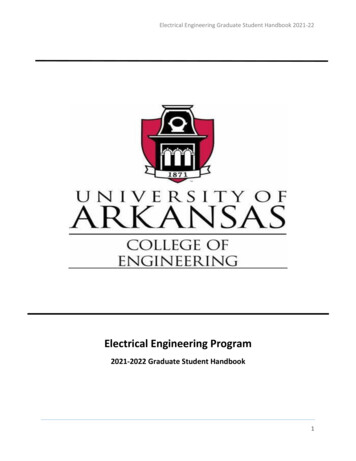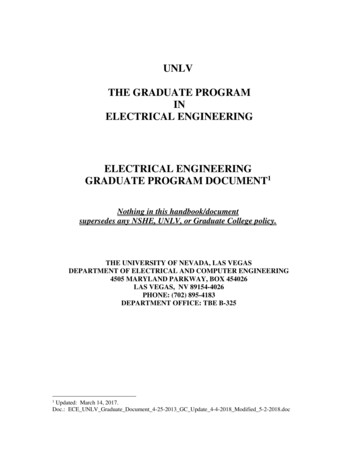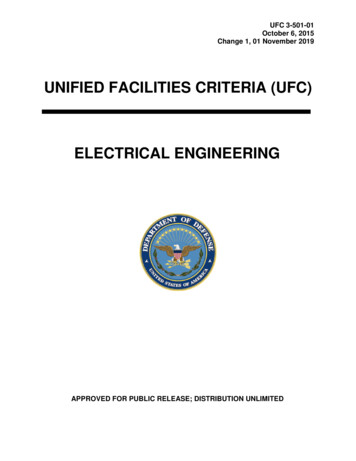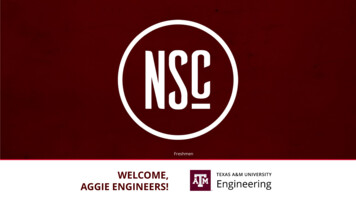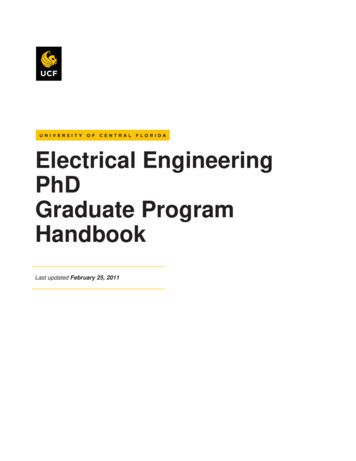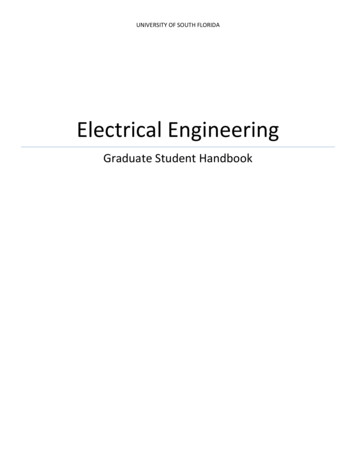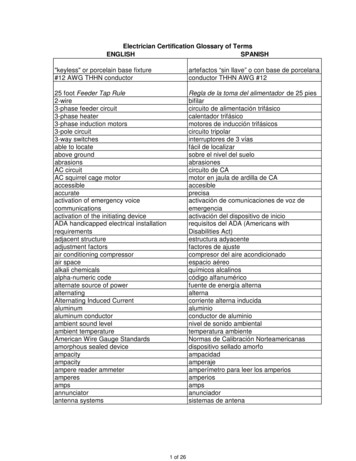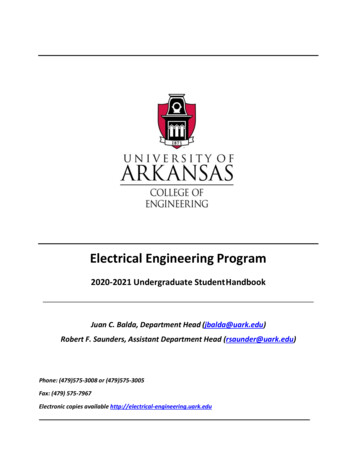
Transcription
Electrical Engineering Program2020-2021 Undergraduate Student HandbookJuan C. Balda, Department Head (jbalda@uark.edu)Robert F. Saunders, Assistant Department Head (rsaunder@uark.edu)Phone: (479)575-3008 or (479)575-3005Fax: (479) 575-7967Electronic copies available http://electrical-engineering.uark.edu
Welcome Note from the Department HeadThe faculty and staff of the Department of Electrical Engineering (www.electricalengineering.uark.edu) welcome you to the University of Arkansas. We strive to offer you a high-qualityundergraduate educational program to enable you to have a very successful professional career.Qualified educators and staff will provide an excellent educational experience so you will be able tocompete as a practicing engineer with electrical engineering (EE) graduates from any other universityas well as become a leader in the society. Our graduates find employment in all disciplines of electricalengineering and are hired by a variety of small to large companies.The Department of Electrical Engineering has been offering the Bachelor of Science in ElectricalEngineering degree since its establishment in 1897 and has been continuously accredited byAccreditation Board for Engineering and Technology (ABET) since 1936. An important characteristicof our eight-semester EE degree plan is the hands-on opportunities provided through laboratoriesassociated with most of our required EE courses. The labs culminate in the senior capstone designcourses where students work on industry sponsored projects or multidisciplinary ones, bringingtogether students from several departments and/or colleges.The main areas of specialization in the Department are (1) communications, radiofrequency/microwaves and terahertz, (2) control systems, (3) integrated circuit design, powerelectronics and power engineering, and (4) microelectronics, nanotechnology and optoelectronics.The University of Arkansas, College of Engineering, and Department of Electrical Engineering offer anumber of scholarships for qualified candidates. Outstanding students with excellent academic recordscould be considered for many prestigious fellowships, which offer competitive stipends and tuition.For students seeking advanced degrees, the department also offers the master (M.S.E.E.) and Doctor ofPhilosophy (Ph.D.) degrees. Students continuing into graduate studies can apply for teaching orresearch assistantships. The M.S.E.E. degree has an online version for mainly those students who areworking off campus.Best wishes for success in achieving your academic and career goals. The faculty and staff are availableto provide assistance during your stay in the department, and if we can be of help in any way, please donot hesitate to contact any of us.Sincerest regards,Juan Carlos BaldaDepartment HeadUniversity ProfessorEmail: jbalda@uark.eduPhone: 479-575-3008
3 PageTable of Contents2020-2021 Undergraduate StudentHandbook . 1Welcome Note from the Department Head. 2ELECTRICAL ENGINEERING AT THE UNIVERSITY OF ARKANSAS. 4What is Electrical Engineering? . 4Electrical Engineering Research Areas . 4Mission of the Electrical Engineering Department . 5Undergraduate Commitment . 5Research Commitment . 5The Electrical Engineering Undergraduate Curriculum . 6ELECTRICAL ENGINEERING CURRICULUM 2020 – 2021. 80B2020-2021 Curriculum: List of Required Courses with Pre- and Co-Requisites for ELEG . 9Advising Form for 2020-2021 EE Plan of Study . 10Electrical Engineering 2020-2021 . 12NOTES FOR 2020-2021. 13Electrical Engineering Undergraduate Curriculum. 13Study Abroad for Electrical Engineering Students . 15Electrical Engineering Academic Emphasis Areas . 15Electrical Engineering Honors Program . 19The EE Curriculum and Medical School . 20FERPA Hold . 21
4 PageELECTRICAL ENGINEERING AT THE UNIVERSITY OFARKANSASWhat is Electrical Engineering?Electrical engineering is a professional engineering discipline that in its broader sense covers thestudy and application of electricity, electronics, and electromagnetism. Electrical engineers are incharge of designing and utilizing electrical components, integrated circuits, integrated chips,computer chips, and electronic assemblies to benefit mankind. Fields of electrical engineeringinclude analog and mixed-signal circuit design/test, biomedical, communications, computer hardware anddigital circuit design, control systems, electronic packaging, embedded systems design, microwave andradar engineering, nanophotonics, nanotechnology/microelectronics/optoelectronics, pattern recognitionand artificial intelligence, power electronics, and renewable energy and power.The electrical engineering graduate is at the forefront of technologies leading to the dramaticincrease in accelerated use of electric power, applications of real time embedded control systemsfor smart highways, the dominating influence of the computer on modern society, globalcommunications, the miniaturization of electronics, smart vehicles and smart gadgets, the use ofwireless chemical and biological nano-sensors for hazard detection, and a host of otherdevelopments. The increased use of electronic equipment for communication, control,measurement, and networking has spread into such diverse areas as agricultural production,automotives, computer networks and hardware, health care, information technology,manufacturing, marketing, recreation, renewable energy, transportation, underwater and spaceexplorations, and many others. This widespread and expanding use of electrical and electronicequipment in virtually all fields has made electrical engineering the largest of all scientificdisciplines and assures a continuing demand for electrical engineering graduates throughoutbusiness and government. Information regarding the average salary of an electrical engineer isavailable on the Electrical Engineering website l Engineering Research AreasAnalog and Mixed-Signal Circuit Design/Test deals with modeling, designing, and testingintegrated circuits and electronic systems that interface the digital world with the real world, includingseveral forms of signal processing.The Biomedical area applies electrical engineering to the field of medicine, including the design ofmedical equipment (e.g., MRI), implantable medical devices (e.g., pacemaker), neural interfaces (e.g.,cochlear implants for the deaf), and electrical therapies (e.g., electrical brain stimulus to minimizeshaking effects of Parkinson's).Communications deals with developing algorithms, protocols, hardware, software, and performanceevaluation techniques, for wireless and wired communications networks and systems.Computer Hardware and Digital Circuit Design deals with designing digital integrated circuits(i.e., computer chips) that are pervasively integrated into today's technological society, includingcomputers, cell phones, MP3 players, DVRs, video games, etc.The Control Systems area deals with developing algorithms and associated hardware to regulatecomplex systems, including robotics, factory automation, flight control, automobile stability,camera focusing and image stability, etc.Electronic Packaging deals with interfacing integrated circuit die to connectors such that theycan be soldered on printed circuit boards. Packaging objectives include decreasing size, increasingperformance, and decreasing electrical interference.Embedded Systems Design combines digital and analog integrated circuit chips along with
5 Pagesoftware to develop complex systems, such as cell phones, MP3 players, digital cameras, etc.Microwave and Radar Engineering exploits the relationship between electricity, magnetism,and waves for applications such as medical imaging, radar systems, wireless communications,antenna design, and defense applications.Nanophotonics exploits the special properties of metals and dielectrics at THz, optical, UV, andIR frequencies for the development of plasmonic solar cells, plasmonic biosensors, and a variety ofoptical onics deals with the study of materials used tofabricate electronic devices as well as the actual fabrication of miniaturized electronic devices, includingsensors, MEMs (Micro Electro Mechanical devices), and optical devices, such as LAZERs.Power Electronics design deals with the modeling, design and test of discrete higher power circuitryfrom fractional horsepower to very large systems.Renewable Energy and Power deals with designing motors, generators, and the circuitry to controlhigh-power devices, as well as designing power generation and distribution systems, which includegreen technology, such as solar energy, wind turbines, and hydroelectric powerMission of the Electrical Engineering DepartmentThe University of Arkansas, the state land grant university, is a nationally competitive, studentcentered, teaching and research university serving Arkansas and the world. As part of theUniversity of Arkansas. The Electrical Engineering Department will provide the educationnecessary to establish the best foundation for electrical engineers at all degree levels, and preparethem to be nationally competitive leaders, skillful at undertaking the current and future challengesfacing our world. (www.uark.edu).Undergraduate CommitmentThe electrical engineering department is committed to producing graduates with a Bachelor ofScience in Electrical Engineering who:1. Are valued as reliable and competent employees by a wide variety of industries, inparticular electrical engineering industries;2. Succeed, if pursued, in graduate studies such as, engineering, science, law, medicine,business, and other professions;3. Understand the need for life-long learning and continued professional development for asuccessful and rewarding career; and4. Accept responsibility for leadership roles, in their profession, in their communities, and inthe global society.In addition to the above program educational objectives, the department is also committed tochallenging gifted undergraduate students to participate in the honors program(http://honorscollege.uark.edu). The honors program gives a structure for a student to work closelywith faculty members and other students in a team environment. As a result, the honors studentgains a more in-depth academic insight along with a quality research experience.Research CommitmentThe Electrical Engineering Department’s research commitment is conducted mainly through thegraduate program. Internal and external funded research projects serve to:1. Discover new knowledge, address technical problems, and develop new electrical/electronic technologies;2. Provide the tools and resources that keep our faculty at the cutting edge of electrical
6 Pageengineering; Advance quickly to management positions in research and development;3. Provide financial support for graduate students and gifted undergraduate students; and4. Improve the quality of life for the citizens of Arkansas and the world.Faculty, students, administrators, and staff conduct the service mission of the department. Theelectrical engineering program, including faculty, students, staff, and facilities, is a major resourceof the state, region, and nation. Faculty members are encouraged to provide services to both thecommunity and the profession. Thus, our faculty members are active in local, state, national, andinternational professional and service organizations, as well as public and private schoolsinvolving grades K-12. A full listing of the faculty, their areas of interest, and email addresses areshown in the Appendix (which is in the website).In summary, the Electrical Engineering program is designed to offer a high-quality path ofinstruction involving classroom, laboratory, and extracurricular activities that results in graduateswho will be nationally competitive leaders, skillful at undertaking the current and future challengesfacing our world.The Electrical Engineering Undergraduate CurriculumThe electrical engineering undergraduate curriculum is designed to provide students withknowledge of scientific principles and methods of engineering analysis to form a solid foundationfor a career in design, manufacturing and processing, research and development, and/ ormanagement. The outcomes of the electrical engineering undergraduate curriculum are thefollowing:1. An ability to identify, formulate, and solve complex engineering problems by applyingprinciples of engineering, science, and mathematics.2. An ability to apply engineering design to produce solutions that meet specified needs withconsideration of public health, safety, and 2019-2020 Criteria for Accrediting EngineeringPrograms – Proposed Changes 40 welfare, as well as global, cultural, social,environmental, and economic factors.3. An ability to communicate effectively with a range of audiences.4. An ability to recognize ethical and professional responsibilities in engineering situationsand make informed judgments, which must consider the impact of engineering solutions inglobal, economic, environmental, and societal contexts.5. An ability to function effectively on a team whose members together provide leadership,create a collaborative and inclusive environment, establish goals, plan tasks, and meetobjectives.6. An ability to develop and conduct appropriate experimentation, analyze and interpret data,and use engineering judgment to draw conclusions.7. An ability to acquire and apply new knowledge as needed, using appropriate learningstrategies.The electrical engineering undergraduate curriculum is divided into three phases: the first year, thesecond and third years, and the senior year. The first-year concentrates on developing a soundunderstanding of basic sciences and mathematics and introduces general engineering concepts.The College of Engineering has adopted a common first year for all new first-year students. Formore information about the first year, please refer to the electrical engineering undergraduatecurriculum in this handbook and also http://first-year-engineering.uark.edu/.Following the first year, students enter the heart of the EE undergraduate curriculum. Thesophomore year provides a transition into electric circuits and digital systems, and largely
7 Pagecompletes the required mathematics. This leads to the junior year containing the majority of therequired technical courses within electrical engineering. The senior year is composed primarily oftechnical electives, both within and outside electrical engineering, where students can exploreseveral areas of interest. At this time, the student in conjunction with their adviser may selecttechnical electives to concentrate in one or more of the technical specializations within electricalengineering, namely, analog and mixed-signal circuit design/test, biomedical, communications,computer hardware and digital circuit design, control systems, electronic packaging, embedded systemsdesign, microwave and radar engineering, nanophotonics, nanotechnology/microelectronics/optoelectronics, pattern recognition and artificial intelligence, power electronics, and renewable energyand power. This final year permits the student to tailor a program suited to his or her individualcareer objectives. Students progressively build their design experience throughout the curriculumand demonstrate this ability in Electrical Engineering Design I and II, where they conceptualize aproject, design the system, and build a working prototype, over the course of two semesters.For those students enrolled in the Honors program, their design experience culminates in theHonors Electrical Engineering Design I and II, and the senior honors thesis. In addition, Honorssections of several electrical engineering courses provide further information on special issues inthe electrical engineering discipline.Lastly, the curriculum also introduces students to subjects in the humanities, social sciences, andprofessional success and ethics so they may better understand the interaction of technology andsociety.The graduation requirement in electrical engineering is 125 semester hours. A full listing,flowchart, and specific details of the present curriculum are given below.Though faculty advisors are quite knowledgeable about the technical aspects of an engineeringeducation, other students are a good resource when it comes to charting a path through thecurriculum. Students are advised to inquire in order to be well informed about various curriculumissues.Please be aware that, in all cases, the curriculum requirements set forth in the University Catalogof Studies supersedes the requirements set forth in this Handbook.
8 PageELECTRICAL ENGINEERINGCURRICULUM 2020 – 2021Freshman Year1434315GNEG 1111MATH 2554CHEM 1103PHYS 2054ENGL 1013semester hoursIntro to Engineering ICalculus IUniversity Chemistry IUniversity Physics IComposition I444416ELEG 2104Electric Circuits I w/ LabELEG 2904Digital Design w/ LabMATH 2584 Differential EquationsSophomore Science Electiveasemester hours1433315GNEG 1121 Intro to Engineering IIMATH 2564 Calculus IIHIST 2003, HIST 2013, or PLSC 2003PHYS 2074University Physics IIENGL 1033 Technical Composition IIsemester hoursSophomore Year444315CSCE 2004Programming Foundations IELEG 2114Electric Circuits IIMATH 2574 Calculus IIIHumanities Electivebsemester hoursJunior Year444416ELEG 3124ELEG 3214ELEG 3704ELEG 3924Systems & Signals Analysis w/LabElectronics I w/ LabApplied Electromagnetics w/ LabMicroprocessor System Designw/ Labsemester hours3443317Math/Science/Technical ElectiveELEG 3224Electronics II w/ LabELEG 3304Energy Systems w/ LabELEG 3143Probability & Stochastic ProcessesSocial Science Electivecsemester hoursSenior Year3333315ELEG 4063Electrical Engineering Design IELEG Technical ElectiveeELEG Technical ElectiveeEngineering Science/Technical ElectivedECON 2013, ECON 2024, or ECON 2143semester hours13333316ELEG 4071Electrical Engineering Design IIELEG Technical ElectiveeTechnical ElectiveTechnical ElectiveSocial Science ElectivecFine Arts Electivefsemester hoursTOTAL: 125 semester hoursa Sophomore Science Elective – CHEM 1123/1121L University Chemistry II, BIOL 1543/1541L Principles of Biology, BIOL2213/2211L Human Physiology, PHYS 2094 University Physics IIIb Humanities course should be chosen from the following list: CLST 1003 Introduction to Classical Studies: Greece, CLST 1013Introduction to Classical Studies: Rome, HUMN 1124H Honors Equilibrium of Cultures 500- 1600, PHIL 2003/2003C/2003HIntroduction to Philosophy, PHIL 2103/2103C Introduction to Ethicsc Social Science Elective should be chosen from one of the following: ANTH 1023 Intro to Cultural Anthropology, COMM 1023Communication in a Diverse World, HDFS 1403 Life Span Development, HDFS 2413 Family Relations, HIST 1113/1113HInstitutions and Ideas of World Civilization I, HIST 1123/11523H Institutions and Ideas of World Civilization II, HUMN1114H Honors Root to Culture to 500 C.E., PLSC 2013 Introduction to Comparative Politics, RESM 2853 Leisure and Societyd Engineering Science/Technical Elective: Any Technical Elective or one of the following 2000 level courses: MEEG 2013Introduction to Machine Analysis, MEEG 2303 – Introduction to Materials, MEEG 2403 – Thermodynamics, CHEG 2313 -Thermodynamics of Single-Component Systems, INEG 2413 Engineering Economic Analysis (Sp, Fa)e CSCE 4114, CSCE 4613, CSCE 4233 are approved ELEG Technical Electives for students pursuing a dual ELEG.CSCE dualundergraduate degreesf Fine Arts Elective should be selected from one of the following: ARHS 1003 Basic Couse in the Arts: Art Lecture, COMM1003 Basic Course in Arts: Film Lecture, DANC 1003 Basic Course in the Arts: Movement and Dance, MLIT 1003/1003HExperiencing Music, MLIT 1013/1013H Music and Society, MLIT 1333 Popular Music, THTR 1003 Basic Course in the Arts:Theatre Appreciation, THTR 1013 Musical Theatre Appreciation
9 Page2020-2021 Curriculum: List of Required Courses with Pre- and Co-Requisites for ELEG0BYear/SemesterNumberCourse TitleFreshman 1Freshman 1Freshman 1Freshman 1Freshman 1GNEG 1111MATH 2554CHEM 1103PHYS 2054ENGL 1013Introduction to Engineering 1Calculus IUniversity Chemistry 1University Physics 1Comp IFreshman 2Freshman 2Freshman 2Freshman 2Freshman 2GNEG 1121MATH 2564PHYS-2074XXXX XXX3ENGL 1033Introduction to Engineering IICalculus IIUniversity Physics IIHistory/Government ElectiveTechnical Composition IISophomore 1Sophomore 1Sophomore 1Sophomore 1ELEG 2104ELEG 2904MATH 2584XXXX XXX4Electric Circuits I w/ LabDigital Design w/ LabDifferential EquationsSophomore Science ElectiveaSophomore 2Sophomore 2Sophomore 2Sophomore 2CSCE 2004ELEG 2114MATH 2574XXXX XXX3Programming Foundations IElectric Circuits II w/ LabCalculus IIIHumanities ElectivebJunior 1Junior 1Junior 1Junior 1ELEG 3124ELEG 3214ELEG 3704ELEG 3924System and Signal Analysis w/ LabElectronics I w/ LabApplied Electromagnetics w/ LabMicroprocessor System Design w/ LabJunior 2Junior 2Junior 2Junior 2Junior 2ELEG 3224ELEG 3304ELEG 3143XXXX XXX3XXXX XXX3Electronics II w/ LabEnergy Systems w/ LabProbability and Stochastic ProcessesSocial Science ElectivecMath/Science/Technical ElectiveSenior 1Senior 1Senior 1Senior 1Senior 1ELEG 4063ELEG XXX3ELEG XXX3XXXX XXX3ECON XXX3EE Design IELEG Technical ElectiveeELEG Technical ElectiveeEngineering Science/Technical ElectivedECON 2013, ECON 2023, or ECON 2143Senior 2Senior 2Senior 2Senior 2Senior 2Senior 2ELEG 4071ELEG XXX3XXXX XXX3XXXX XXX3XXXX XXX3XXXX XXX3EE Design IIELEG Technical ElectiveeTechnical ElectiveTechnical ElectiveSocial Science ElectivecFine Arts ElectivefPre-RequisitesCo-Requisites gFirst YearFirst Year EngineeringMATH 2554GNEG 1111MATH 2554PHYS 2054As Indicated in CatalogENGL 1013Sophomore YearaEngineering MajorELEG 2104L, MATH 2564ELEG 2904LAs Indicated in CatalogMATH 2554ELEG 2104MATH 2564As Indicated in CatalogJunior YearELEG 2104PHYS 2074ELEG 2114ELEG 3214, MATH 2584ELEG 2114Lab ComponentELEG 2114L, MATH 2584ELEG 3124L, MATH 2584ELEG 3214L, MATH 2574, ELEG 2114ELEG 3704L, PHYS 2074, MATH 2574ELEG 2904, ELEG 3924LELEG 3224LELEG 3304LELEG 3124As Indicated in CatalogAs Indicated in CatalogSenior YearELEG 3224, ELEG 3924As Indicated in CatalogAs Indicated in CatalogAs Indicated in CatalogAs Indicated in CatalogELEG 4063As Indicated in CatalogAs Indicated in CatalogAs Indicated in CatalogAs Indicated in CatalogAs Indicated in CatalogSophomore Science Elective – CHEM 1123/1121L University Chemistry II, BIOL 1543/1541L Principles of Biology, BIOL2213/2211L Human Physiology, PHYS 2094 University Physics IIIb Humanities course should be chosen from the following list: CLST 1003 Introduction to Classical Studies: Greece, CLST 1013Introduction to Classical Studies: Rome, HUMN 1124H Honors Equilibrium of Cultures 500- 1600, MUSY 2003/2003HMusic in World Cultures, WLIT 1113 World Literature I, WLIT 1123 World Literature II, Intermediate-level world language(usually 2003-level)c Social Science Elective should be chosen from one of the following: HDFS 1403 Life Span Development, HDFS 2603 ruralFamilies and Communities, HIST 2093 Animals in World History, HUMN 1114H Honors Root to Culture to 500 C.E.,HUMN 2114H Honor Birth of Modern Culture 1600-1900, INST 2013 Introduction to International and Global Studiesd Engineering Science/Technical Elective: Any Technical Elective or any of the following 2000 level courses: MEEG 2013Introduction to Machine Analysis, MEEG 2303 – Introduction to Materials, MEEG 2403 – Thermodynamics, CHEG 2313 -Thermodynamics of Single-Component Systems, INEG 2413 Engineering Economic Analysis (Sp, Fa)e CSCE 4114, CSCE 4613, CSCE 4233 are approved ELEG Technical Electives for students pursuing a dual ELEG.CSCE dualundergraduate degreesf Fine Arts Elective should be selected from one of the following: ARHS 1003 Basic Couse in the Arts: Art Lecture, COMM1003 Basic Course in Arts: Film Lecture, DANC 1003 Basic Course in the Arts: Movement and Dance, MLIT 1003/1003HExperiencing Music, MLIT 1013/1013H Music and Society, MLIT 1333 Popular Music, THTR 1003 Basic Course in the Arts:Theatre Appreciation, THTR 1013 Musical Theatre Appreciationg Co-requisites may be taken prior to the class listed or with the class listed.
10 P a g eAdvising Form for 2020-2021 EE Plan of StudyNAMESTUDENT ID NUMBERindicates pre-Reqindicates Co/Pre-Reqindicates drop down box selectionFRESHMAN YEARPre-ReqCo-ReqFall Semester# Sem GRPre-ReqSpring Semester# Sem GRGNEG 1111 Intro to Engineering I1GNEG 1111GNEG 1121 Intro to Engineering II1MATH 2554 Calculus I4MATH 2554MATH 2564 Calculus II4CHEM 1103 University Chemistry I3History/Political Science Elective3PHYS 2054 University Physics I4PHYS 2054PHYS 2074 University Physics II4ENGL 1013 Composition I3ENGL 1013ENGL 1033 Technical Composition II3University Credits0University Credits0Transfer and Credit Hours0Transfer and Credit Hours0Number of "D" Hours0Number of "D" Hours0Co-ReqFall Semester# Sem GRPre-ReqMATH 2564ELEG 2104 Electric Circuits (With Lab)4MATH 2554ELEG 2904 Digital Design (With Lab)4ELEG 2104MATH 2584 Differential Equations4MATH 2564Sophomore Science Elective ClassMATH 2554Co-ReqMATH 2564SOPHOMORE YEARPre-ReqMATH 2564Co-ReqSpring Semester# Sem GRCSCE 2004 Programming Foundations I4ELEG 2114 Electric Circuits II (With Lab)4MATH 2574 Calculus III43Lower Level Humanities Elective3Sophomore Science Elective Lab1University Credits0University Credits0Transfer and Credit Hours0Transfer and Credit Hours0Number of "D" Hours0Number of "D" Hours0Fall Semester# Sem GRELEG 3124 System & Signal Analysis (With Lab)4ELEG 3214 Electronics I (With Lab)4MATH 2584JUNIOR YEARPre-ReqELEG 2104Co-ReqMATH 2584PHYS 2074ELEG 2114MATH2574ELEG 2114Pre-ReqCo-ReqSpring Semester# Sem GRMath/Science/Technical Elective3MATH 2584ELEG 3224 Electronics II (With Lab)4ELEG 2114ELEG 3304 Energy Systems (With Lab)4ELEG 3143 Probability & Stochastic Processes3ELEG 3214PHYS 2074MATH 2574ELEG 3704 Applied Electromagnetics (With Lab)4ELEG 2904ELEG 3924 Microprocessor System Design (With Lab)4Lower Level Social Science Elective3University Credits0University Credits0Transfer and Credit Hours0Transfer and Credit Hours0Number of "D" Hours0Number of "D" Hours0Fall Semester# Sem GRPre-ReqELEG 4063 Electrical Engineering Design I3ELEG 4063ELEG Technical ElectiveELEG Technical ElectiveELEG 3124SENIOR YEARPre-ReqCo-ReqELEG 3224Co-ReqSpring Semester# Sem GRELEG 4071 Electrical Engineering Design II13ELEG Technical Elective33Technical Elective*3Engineering Science OR Technical Elective*3Technical Elective*3Economics Elective3Lower Level Social Science Elective3University Credits0Lower Level Fine Arts Elective3Transfer and Credit Hours0Universtiy Credits0Number of "D" Hours0Transfer and Credit Hours0Number of "D" Hours0Did you enroll before Fall 2014?NoTOTAL TRANSFER AND CREDIT HOURS0TOTAL UNIVERSITY CREDIT HOURS0TOTAL NUMBER OF "D" HOURS0ONLY 8 HOURS OF 'D'NoNOTESFaculty Signature:Date:Student Signature:Date:*3000 or above level courses in Math, Engineering, or the science after the approval of an ELEG advisor; histor courses in the Math and the sciences (e.g., MATH 3133) are not eligible for technical elective*CSCE 2014 Programming II and CSCE 2214 Computer Organization are allowable non-ELEG technical electives*Students who have (1) Talked to the departmental co-op coordinator, Robert Saunders, about the intention of taking three GNEG 3811 courses for 3 hours of non-ELEG technical electives, and (2) Thegrades in these courses were A or B, may get credit for three hours of non-ELEG technical electives. Please consult the department regarding this if you have any further questions. GNEG 3801 cannot beused for technical elective credit.*Students cannot use ELEG 3903, ELEG 3913, or ELEG 3933 to meet this requirement.
11 P a g eThe above form is designed so that students and advisors can keep record of the courses they have taken,the grades received, and whether the pre- and co-requisites have been met. An interactiveversion is available at undergraduatestudents/index.php.
12 P a g eElectrical Engineering 2020-2021Curriculum FlowchartENGL 10
Electrical Engineering Program 2020-2021 Undergraduate Student Handbook Juan C. Balda, Department Head (jbalda@uark.edu) Robert F. Saunders, Assistant Department Head (rsaunder@uark.edu)
